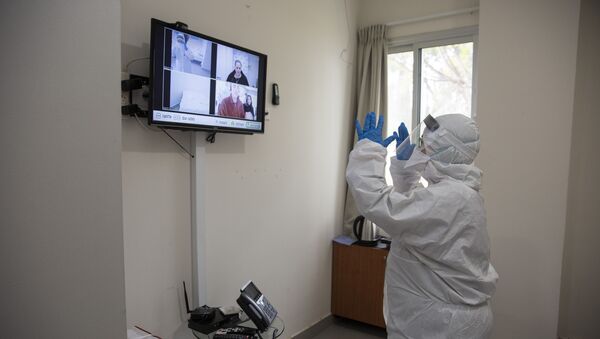Israel continues to implement strict measures to contain the spread of the coronavirus that has claimed the lives of more than 180 Israelis.
Later today, the government is expected to approve a series of restrictions that would include a ban on visiting army cemeteries ahead of Memorial Day as well as the lockdown of towns and neighbourhoods during celebrations of the country's 72nd anniversary.
So far these measures seem to be bearing fruit with reports suggesting that the rate of COVID-19 infections has slowed down in Israel, and Professor Arnon Afek, deputy Director General of the country's largest hospital Sheba Tel Hashomer, says it was the measures implemented by the government that contributed to this success.
Strict Measures Prove Themselves
At the beginning of March, when news of the first patients diagnosed with the virus started coming in, Israel introduced a series of stringent restrictions. At first, Tel Aviv suspended flights, put thousands of Israelis under quarantine and requested tourists to leave the country.
But as the situation deteriorated the Jewish state was quick to shut down its government offices and public institutions, cancelled culture and sports events, and imposed full lockdowns on entire towns and neighbourhoods.
"The decisions taken by the government were correct. They gave Israeli doctors the time to prepare", says Afek, whose hospital was the first in Israel to take on the coronavirus challenge by opening an isolated ward aimed at handling COVID-19 patients.
Within days they set up intensive care units, operating, and delivery rooms and even a psychiatric department, all designed to respond to the growing number of cases.
Israel's Healthcare System Under Threat?
But Israeli media was not optimistic about the country's ability to cope with the rising challenge. Neither were some of the country's doctors.
In February, Israel's Association of Public Health Doctors issued a statement saying the country's medical system didn't have the means to fight the pandemic and urged the government to take quick and significant measures to improve the situation.
Even though the government pledged millions of dollars for the medical sector, for many the monetary boost was too little, too late. The reason being that even before the outbreak of the virus, Israel invested less in its healthcare than any other OECD country, reports suggested, adding that the Jewish state had only spent 7.5 percent of its GDP, much lower than what other states were forking out.
The lack of generous funding impacted the country's health system and resulted in fewer nurses and hospital beds, older doctors and less medical equipment, with Israel's press repeatedly warning that the healthcare system would collapse in the event of a serious challenge.
One such challenge could be a sudden rise in COVID-19 patients in need of ventilators. Israel currently possesses some 2,400 breathing machines and the fear was that a drastic increase in the amount of acute cases would cause the country's health system to collapse, similar to what was seen in Italy where patients were cut off from oxygen.
Nothing to Worry About
But Afek says it would require much more than the coronavirus to disrupt Israel's healthcare system.
"We have survived the pharaoh and we will survive this too. You need much more than COVID-19 to break Israel's ingenuity and spirit".
Indeed, it was Israel's creative approach to the challenge that reduced the blow to the health system. First of all, as the amount of cases started mounting, authorities were quick to transform some of the nation's biggest hotels into coronavirus hospitals housing patients with less serious cases, a move that took the burden off the country's already crowded medical institutions.
Then it was the decision to utilise Israel's army and the secret intelligence service, Mossad, in the national effort to curb the spread of COVID-19.
Boasting ties with officials and businessmen, it was Mossad that provided Israel with protection masks and other equipment at a time when competition for them is tight.
Israel also made a decision not to rely on others, setting up its own production line for breathing machines and other equipment.
"We are a capable and flexible nation. [If worse comes to worst], we will manufacture our own hospital beds and will turn the underground parking lots into coronavirus departments", explained Afek admitting that Israel still lacked the funds, the knowledge, and the experience to deal with such issues.
"We don't know enough about the disease but we do know that the world will not go back to what it was before. Masks and social separation will now be an integral part of our daily lives. COVID-19 will not disappear in the foreseeable future. It will take months, if not a couple of years for the world to develop a vaccine", he summed up.




